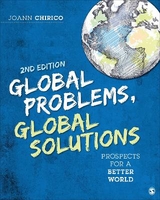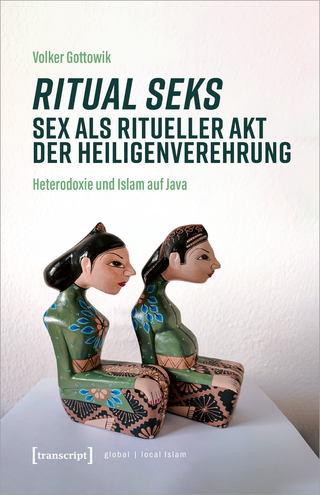
Global Problems, Global Solutions
SAGE Publications Inc (Verlag)
978-1-5063-4778-3 (ISBN)
JoAnn Chirico, emerita, received her Ph.D. in sociology from the University of Pittsburgh. While originally a doctoral candidate in education, she found that sociology provided the theoretical tools to analyze the problems she investigated—the coincidence of the global rise of both progressive and fundamentalist movements in education, religion, and other dimensions of social life. Intrigued by Emile Durkheim’s pronouncement that individual differentiation would proceed to such an extent that all we ultimately would have in common was our humanity, she began her study of globalization—the integration of humanity into a social order. Most of her career was at the Beaver campus of Pennsylvania State University, where she emphasized the importance of research and evidence, the global perspective, and civic engagement in her classes. She has presented workshops on internationalizing the curriculum and engaging students in service learning at conferences over the years. Her previous publications for SAGE include Sociological Research Exercises for the Global Age, a lab manual of mini research exercises for introductory sociology courses, and Globalization: Prospects and Problems.
Introduction
Acknowledgments
About the Author
Chapter 1. Private Troubles and Social Problems: Developing a Sociological Imagination
It Was the Best of Times, It Was the Worst of Times
Private Troubles, Public Issues
Vulnerability to Global Problems
Using a Social Science Lens
Glass Half Empty or Half Full?
Perspectives for Studying Problems
Understanding the Global Order
Part I: Nourishing Human Capital
Chapter 2. Socioeconomic Fault Lines: Inequality, Poverty, and Development
How Well Does the Global Economy Function?
Understanding Inequality
Impacts of Global Poverty and Inequality
Quality of Life Along Levels of Development
Origins of Contemporary Inequality Among Nations
Factors Influencing Varying Levels of Development
Varying Pathways to Development
Fighting Poverty and Inequality
Chapter 3. Starving in the Shadow of Plenty
The Global Food System
Food Security
How Can We Fix Our Broken Food System?
Food Safety Nets
Chapter 4. Optimizing Human Capital: Good Health
The Global Burden of Disease
How Our Lifestyles Harm Us: Non-Communicable Disease
Discrimination in Health Care
Anomie in the 21st Century: Mental Health Concerns
Infectious Outbreak, Epidemic, Pandemic
Making Health Care Work
Coordinated Action
Chapter 5. Expanding Horizons Through Lifelong Learning
Achieving Universal Education
Measuring Quality Education
The Pivotal Problem of Funding
Reaching More with Education
Improving the Quality of Education
Part II: Restoring Civility to Social Life
Chapter 6. From Difference to Discrimination: Fault Lines of Race, Ethnicity, and Religion
Defining Difference: Diversity and Meaning
Burned by the Sun or White Like the Ice: The Social Creation of Race
The Rights of Indigenous Communities: The "First" Peoples
Human Rights, Life Chances, and Discrimination
Falling Between the Cracks: Statelessness in a World of States
Having the Wrong Religion Could Cost You Your Life
Confronting Discrimination and Persecution
Chapter 7. You Can′t Empower Us with Chickens: Gender Through the Lifespan
Gender Inequality and Human Development
Gender Inequities Throughout the Lifespan
Chapter 8. When Life Becomes a Commodity: Human and Wildlife Trafficking
Globalization Effects on Crime
Individual and Environmental Vulnerability to Transnational Organized Crime
The Legal Framework to Combat Transnational Organized Crime
Human Trafficking: When People Become a Commodity
Combatting Human Trafficking
Trafficking in Wildlife: Flora and Fauna
Chapter 9. Transnational Property Crimes
The War on Drug Trafficking
The Human Cost of Illegal Drugs
Death and Violence Along Trafficking Routes
Economic Costs of Drugs and Alternative Development
Trafficking in Firearms and Weaponry
Intellectual Property Crime: Trafficking in Counterfeit and Pirated Goods
Emerging Crimes
Combatting Cybercrime: The Legislative Framework
Combatting Transnational Crimes
Chapter 10. The Challenge of Political Violence
The Nature of War, Armed Conflict, and Political Instability
Correlates and Causes of Violent Conflicts
Consequences and Costs of Violent Conflict
The Conflict Trap
Protecting Peace and Problems of Peacemaking
Promoting Peace and Getting Out of the Conflict Trap
Part III: Sustaining Natural and Manufactured Environments
Chapter 11. Global Flows of Refugees
Types of Migration
Global Flows of Refugees
Life as a Refugee
The "Solutions"
Internally Displaced Persons
Chapter 12. Environmental and Economic Migration
What Is a Migrant?
Patterns of Migration
Displaced by Climate Change and Environmental Disaster
Demographic, Economic, and Social Impacts of Migration
Populist Backlash to Immigration
Mitigating the Challenges of Migration
Chapter 13. Destruction and Depletion of the Natural Environment
Scope of Environmental Problems
Chemical Contaminants
Air, Land, and Water Degradation and Depletion
Developing Nations and Toxic Dumping
Pollution in the Developing World
Water Pollution in the Developed World
Environmental Assessment in the United States
Depletion of Water Resources
The Global Water Regime
A Global View: Air Pollution
Land Degradation
The Forests
The Global Chemical Regime
Escaping the Toxic: Living Green
Chapter 14. Climate Change and Global Warming
The Threat of Climate Change
The Symptoms of a Changing Climate
Extreme Weather and Displaced People
Health and Nutrition Effects
The Environmental Regime
"Greening" the Earth: Sustainable Development
Chapter 15. Urbanization: The Lure of the Cities
What Makes a City?
What Does it Mean to Be Urban?
Contemporary Cities
The Urban Slums: Cities of Tomorrow?
Achieving Urban Sustainability
Chapter 16. A World Gone Awry? The State of Governance
Is the World Unmanageable?
Goals of Governance
Layers of Governance
A Normative Basis for Good Governance
Meeting the Challenges of Governance
References
Index
| Erscheinungsdatum | 07.11.2018 |
|---|---|
| Verlagsort | Thousand Oaks |
| Sprache | englisch |
| Maße | 203 x 254 mm |
| Gewicht | 1530 g |
| Themenwelt | Sozialwissenschaften ► Ethnologie ► Völkerkunde (Naturvölker) |
| Sozialwissenschaften ► Soziologie | |
| ISBN-10 | 1-5063-4778-9 / 1506347789 |
| ISBN-13 | 978-1-5063-4778-3 / 9781506347783 |
| Zustand | Neuware |
| Haben Sie eine Frage zum Produkt? |
aus dem Bereich



